

15 'Brain Foods' To Incorporate Into Your Diet - Food for the Brain. Dr COURTNEY CRAIG — Diet & Nutrition for Chronic Fatigue & Fibromyalgia. 3 Foods That Make Your Brain Work Remarkably Better. That’s why I recommend people throw away their multivitamin and eat liver instead.
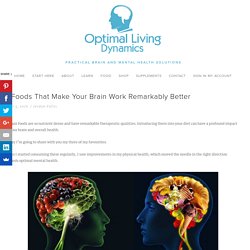
You can search for high-quality pastured meat at EatWild.com, and if you live in the United States, you can order high-quality, grass-fed beef liver through US Wellness Meats and get shipped right to your house. And the great thing about organ meats such as liver is that they're much cheaper than muscle meat. So you actually save money by purchasing the healthiest part of the animal. And if you can’t find high-quality grass-fed liver in your area or don’t like the taste of liver, I recommend raw beef liver powder in capsule form by Perfect Supplements. Top Foods For Brain Health. Here are some healthy foods that come with an added bonus: they have been shown to protect the aging brain and enhance cognitive function.
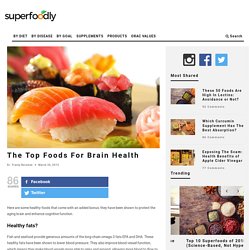
Healthy fats? Fish and seafood provide generous amounts of the long-chain omega-3 fats EPA and DHA. 15 Brain Foods To Boost Focus and Memory. What does the food you eat have to do with how your brain functions? Turns out an awful lot. While we’ve always known that what we eat affects our bodies and how we look, scientists are also learning more and more that what we eat takes a toll on our brains.
Brain Foods. Consuming brain foods is the best route to boost memory, focus, concentration, and other cognitive functions.
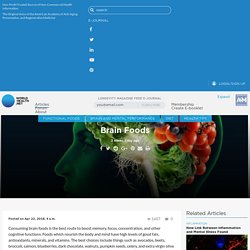
Foods which nourish the body and mind have high levels of good fats, antioxidants, minerals, and vitamins. The best choices include things such as avocados, beets, broccoli, salmon, blueberries, dark chocolate, walnuts, pumpkin seeds, celery, and extra virgin olive oil, among others. Avocados contain high levels of monounsaturated fats and vitamin K which can help to reduce blood clots which can affect cognitive health. Beets are loaded with cancer preventing antioxidants and nitrates which can help prevent plaque deposition in the brain.
Celery is a great source of luteolin which can help decrease inflammation in brain microcapillaries. Eating 5-A-Day Promotes Mental Wellbeing. Eating plenty of fruit and vegetables may protect both mental and physical wellbeing.

Research has uncovered a link between fruit and vegetable consumption and mental wellbeing. Dr Saverio Stranges and colleagues at Warwick University (UK) examined data of 14,000 people taking part in the Health Survey for England in order to investigate the links between lifestyle choices and mental wellbeing. Why Eat More Than Ten Servings of Fruits and Vegetables Daily? – Lacto Bacto. Red Wine Compound Raises Neurogenesis. Resveratrol doubles the growth and development of neurons, in a lab animal model.
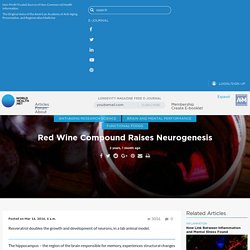
The hippocampus – the region of the brain responsible for memory, experiences structural changes that are thought to contribute to aging-related memory and mood impairments. Ashok K. 10 Lesser-Known Foods for Brain Health. Can Beetroot Juice Help Keep Your Brain Youthful? (Interview with Jonathan Burdette, MD) Aging has long been characterized as a loss of complexity.
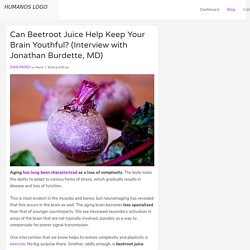
The body loses the ability to adapt to various forms of stress, which gradually results in disease and loss of function. This is most evident in the muscles and bones, but neuroimaging has revealed that this occurs in the brain as well. The aging brain becomes less specialized than that of younger counterparts. We see increased secondary activation in areas of the brain that are not typically involved, possibly as a way to compensate for poorer signal transmission. Hops Compound May Improve Cognitive Skills. Xanthohumol, a type of flavonoid found in hops and beer, may improve cognitive function, in a mouse model.
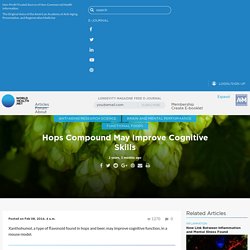
A flavonoid found in hops and beer, xanthohumol has garnered scientific interest as a potential therapeutic compound for Metabolic Syndrome, a condition associated with obesity, high blood pressure and other concerns, including age-related deficits in memory. Previous studies have used xanthohumol to lower body weight and blood sugar in a rat model of obesity. Daniel Zamzow, from Oregon State University (Oregon, USA), and colleagues employed a mouse model to explore whether xanthohumol could affect a process known as palmitoylation, which is a normal biological process but in older animals may become harmful.
The researchers found that xanthohumol can speed the metabolism, reduce fatty acids in the liver and, at – in young mice, improve their cognitive flexibility. Your Brain on Chocolate. Source: Emily Deans MD Chocolate, a fermented extract of the seed pods of the Theobroma cacao plant, is one of the world’s most popular foods.
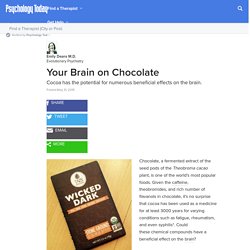
Given the caffeine, theobromides, and rich number of flavanols in chocolate, it’s no surprise that cocoa has been used as a medicine for at least 3000 years for varying conditions such as fatigue, rheumatism, and even syphilis*. Could these chemical compounds have a beneficial effect on the brain? If we look at observational studies (link is external) tracking chocolate consumption and depression, the outlook is gloomy, with more depressed individuals reporting consuming more servings of chocolate per month. An older study linked consumption of chocolate to a higher suicide rate (1). NEWS: Greens Every Day Keeps Brain 11 Years Younger - Blue Zones. Salad lovers, rejoice!
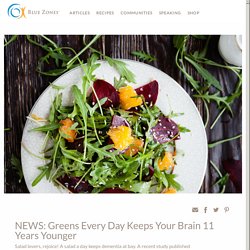
A salad a day keeps dementia at bay. A recent study published in Neurology found that people who consumed 1-2 servings of leafy green vegetables each day experienced fewer memory problems and cognitive decline than people who rarely ate leafy greens. Nutritional Brain Bomb: Thiamine Deficiency. People maligning a modern diet tend to poke fingers at the the last 30 - 40 years.
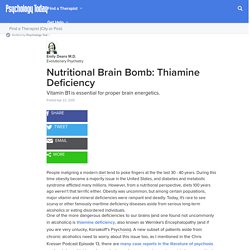
During this time obesity became a majority issue in the United States, and diabetes and metabolic syndrome afflicted many millions. However, from a nutritional perspective, diets 100 years ago weren’t that terrific either. Obesity was uncommon, but among certain populations, major vitamin and mineral deficiencies were rampant and deadly. Today, it's rare to see scurvy or other famously maritime deficiency diseases aside from serious long-term alcoholics or eating disordered individuals. Improve Brain Function with Blueberry Concentrate. Results of a recent study from the University of Exeter show that concentrated blueberry juice improves brain function in older adults.
Some degree of cognitive decline is normal during the aging process. It generally manifests as forgetfulness, loss of focus, and decreased ability to solve complex problems. When mild, symptoms can easily go unnoticed. Heavy Metal: Iron and the Brain. Source: Wikimedia commons Iron deficiency is the most common nutritional problem in the world, affecting at least 2.5 billion people. In developing countries, as many as 40% of young children and 50% of pregnant women are deficient (link is external). Iron is a prevalent mineral, making up 5% of the earth’s crust (link is external), but a combination of inefficiency in absorption, poor iron in certain staple grain foods, and medical conditions make low iron levels a frequent occurrence among humans.
Even in first world countries, iron is the most common nutrient deficiency. Leafy Greens Support Memory & Thinking. Spinach, kale, collards, and mustard greens are abundant in vitamin K, lutein, folate and beta carotene. Previously, studies report that vitamin K, lutein, folate and beta carotene are nutrients that may slow cognitive decline typical of aging.
Martha Clare Morris, from Rush University Medical Center (Illinois, USA), and colleagues studied 954 participants in the Memory and Aging Project, average age 81 years, who reported their daily food and beverage intake by a standard questionnaire. The researchers computed the total daily nutrients by combining the nutrient content for each food consumed with the number of servings eaten each day. Eating Fish Weekly Good for Brain Health. Soda Begets Zombies. So soda consumption might not actually rot your brain, causing the uncontrollable desire to consume others. But calories devoid of micronutrients might have a behavioral consequence, and the sugary variety of soda might well be causing depression in those vulnerable to fructose malabsorption. Have a look at my previous post on the subject. Today I have a mere observational study that adds to a pile of evidence that soda ain't the best thing in the world to be drinking, behaviorally speaking.
"The Twinkie Defense: the relationship between carbonated non-diet soft drinks and violence perpetration among Boston high school students (link is external). " Eating Fish Once A Week Linked To Higher IQ And Better Sleep. Best Foods For the Brain. Your Brain on Creatine. Evolutionary Psychiatry: Turboboost Your Brain: Eat Meat. The 7 Worst Foods for Your Brain. Evolutionary Psychiatry: Wheat, Rice, and Children's Brains. Two Foods That May Sabotage Your Brain: Gluten & Dairy. Is soda bad for your brain? (And is diet soda worse?) Do Carbs Keep You Sane? Do Carbs Make You Crazy? Side-Effects of Aspartame on the Brain. Low levels of alcohol good for the brain, study shows.
Crisco and Cocaine. Butyrate, neuroepigenetics and the gut microbiome: Can a high fiber diet improve brain health? The Prevalence of Antibodies against Wheat and Milk Proteins in Blood Donors and Their Contribution to Neuroimmune Reactivities.